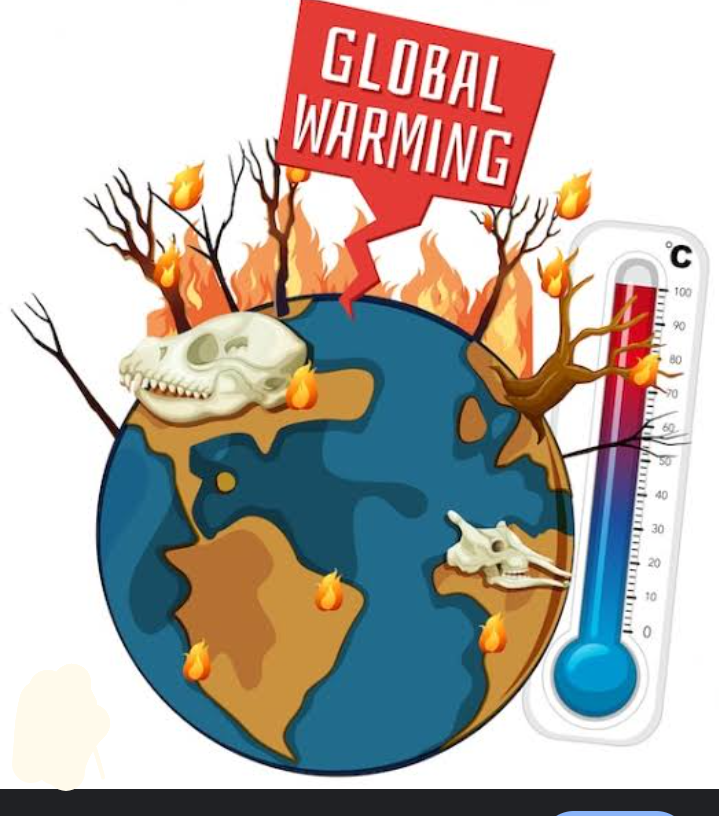Global warming

Global warming is the gradual increase in the overall temperature of the Earth's atmosphere, primarily caused by human activities that release large amounts of greenhouse gases, such as carbon dioxide and methane, into the atmosphere. This phenomenon has been the subject of extensive scientific research and public concern in recent decades.
The main cause of global warming is the burning of fossil fuels, such as coal, oil, and gas, which releases massive amounts of carbon dioxide into the atmosphere. Deforestation and land-use changes, such as the clearing of land for agriculture, are also significant contributors. The concentration of carbon dioxide in the atmosphere has increased by about 40% since the Industrial Revolution, primarily due to fossil fuel burning and land-use changes.
The effects of global warming are widespread and varied. Some of the most significant consequences include:
- Rising sea levels: Thawing of polar ice caps and glaciers, leading to increased coastal erosion and flooding.
- Extreme weather events: Increased frequency and intensity of heatwaves, droughts, and heavy rainfall.
- Water scarcity: Changes in precipitation patterns and increased evaporation due to warmer temperatures.
- Loss of biodiversity: Changes in ecosystems and extinction of species due to habitat destruction and disruption of natural processes.
- Negative impacts on human health: Increased risk of heat-related illnesses, respiratory problems, and the spread of disease vectors.
The urgency to address global warming cannot be overstated. If left unchecked, it will have catastrophic consequences for the planet and human societies. However, there are steps that can be taken to mitigate its effects:
- Transition to renewable energy sources: Shift from fossil fuels to solar, wind, and other clean energy sources.
- Energy efficiency: Improve the energy efficiency of buildings, transportation, and industry.
- Carbon capture and storage: Develop and deploy technologies to capture and store carbon dioxide emissions.
- Sustainable land-use practices: Implement reforestation and conservation efforts, and adopt sustainable agriculture practices.
- International cooperation: Collaborate globally to share knowledge, technologies, and best practices to address this global challenge.
In conclusion, global warming is a pressing issue that requires immediate attention and collective action. We must work together to reduce greenhouse gas emissions, adapt to the changing climate, and ensure a sustainable future for all.
Global warming is a pressing issue that requires immediate attention and collective action. We must work together to reduce greenhouse gas emissions, adapt to the changing climate, and ensure a sustainable future for all.

One of the most critical steps we can take is to transition away from fossil fuels and towards renewable energy sources like solar, wind, and hydroelectric power. This can be achieved through a combination of government policies, technological innovation, and individual actions.
Governments can play a crucial role by implementing policies like carbon pricing, tax incentives for clean energy, and regulations that promote energy efficiency. Technological innovations like advanced solar panels, energy storage systems, and smart grids can also help to accelerate the transition to renewable energy.
Individuals can also make a difference by making conscious choices in their daily lives. This can include simple actions like using public transport, carpooling, or driving electric vehicles, as well as making energy-efficient choices in their homes and workplaces.
Another critical aspect of addressing global warming is adapting to the changing climate. This includes implementing measures to protect vulnerable communities from the impacts of extreme weather events, sea-level rise, and other climate-related disasters.
Climate-resilient infrastructure, early warning systems, and emergency preparedness plans can all help to reduce the risks associated with climate change. Additionally, ecosystem-based adaptation approaches like reforestation, wetland restoration, and conservation of natural habitats can help to maintain ecosystem services and promote biodiversity.
International cooperation is also essential for addressing global warming. The Paris Agreement, signed in 2015, brings together almost 200 countries in a commitment to limit global warming to well below 2°C and pursue efforts to limit it to 1.5°C above pre-industrial levels.
The agreement also encourages countries to increase their use of renewable energy, improve energy efficiency, and reduce deforestation and land degradation. Global cooperation on climate change can also facilitate the sharing of knowledge, technologies, and best practices, helping to accelerate the transition to a low-carbon economy.
In conclusion, global warming is a pressing issue that requires immediate attention and collective action. We must work together to reduce greenhouse gas emissions, adapt to the changing climate, and ensure a sustainable future for all. By transitioning to renewable energy sources, adapting to the changing climate, and cooperating internationally, we can mitigate the worst impacts of global warming and create a better future for ourselves and future generations.
